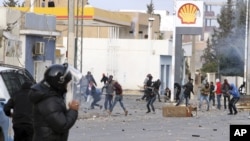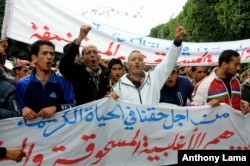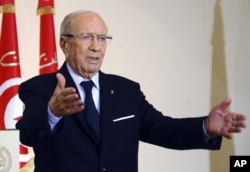Rights activists and economists have been warning for months that growing disaffection among young jobless Tunisians would soon test the stability of the country.
They say the government has failed to even outline a plausible program to develop Tunisia economically, especially to help develop distressed rural areas, which have become recruiting grounds for jihadists.
Their fears were borne out this week when Tunisia became engulfed in violent street protests and attacks on police stations, which prompted the government to order an overnight nationwide curfew on Friday. The Interior Ministry said in a statement that attacks on public and private property “represent a danger to the country and its citizens.”
Government officials said they needed the curfew to try to prevent a repeat of Thursday night, when police stations came under assault and security personnel resorted to tear gas to stop protesters armed with stones and Molotov cocktails from looting stores and warehouses.
The street demonstrations started last week after a young man who failed to secure a government job scaled a transmission tower in Kasserine, an impoverished city in the center of the country, in protest and was electrocuted.
More angry youngsters have threatened to kill themselves. Two were injured this week after trying to throw themselves off the roof of a local government building.
Frustrated youth
While the government has focused on the jihadist threat, fearing that returning fighters from Syria would present a real challenge to the state, the more immediate danger for weeks has been from working class youngsters frustrated with the few job opportunities available to them.
“Unfortunately, the situation is getting worse,” says university professor Jelel Ezzine, president of the Tunisian Association for the Advancement of Science, Technology and Innovation, a research institution. “In addition to the incompetence of the government and the political system, the coalition behind the government is blindly defending the ministers and their non-deeds irrespective of the results and the ongoing unrest,” he adds.
He says the government is failing to understand that the economic fundamentals have to change and they must be “addressed head on.”
Under the surface, there has been growing public disaffection with the government for months. Working class Tunisians who hoped the Arab spring ouster of longtime strongman Zine Abidine Ben Ali would bring jobs have seen little economic benefit.
Thirty-seven percent of young Tunisians are unemployed and jobless graduates have been joining the labor movement in increasing numbers of protests and sit-ins. Strikes by public sector workers have recently soared.
In a televised address Friday night, Tunisia’s president, Beji Caid Essebsi, said he understands the frustration that has built up and led to this week’s protests over unemployment, but he cautioned that instability could be exploited by jihadists. He pledged the country would “get out of this ordeal.”
“There is no dignity without work. You can't tell someone who has nothing to eat to stay patient,” the president acknowledged. He warned that the Islamic State militant group in neighboring Libya could use the unrest "to infiltrate into Tunisia".
Unemployment has worsened since the 2011 revolution that toppled Ben Ali — the first in a series of uprisings across the Arab world. Tunisia has, in many ways, remained the one hopeful story to come out of the Arab spring, the only country in the region that overthrew a dictator and emerged as a democracy.
Jihadist threat
But the transition has been bumpy and fraught with peril. Social exclusion and poverty — the drivers of the 2011 uprising — persist. And there is a growing jihadist threat, which has attracted more attention from Western governments determined to help Tunisia than the underlying economic challenges that help groups like the Islamic State recruit.
Tunisia has already seen deadly attacks perpetrated by its own citizens in the name of Islamic extremism. In June, a Tunisian engineering student gunned down dozens of tourists at a beach hotel in Sousse. In March, two gunmen – also Tunisians – killed 22 people at the Bardo National Museum in Tunis. Officials say the perpetrators in both attacks trained at a militant camp in neighboring Libya.
More than 3,000 Tunisians are fighting in radical Islamist militant groups in Iraq and Syria. Hundreds have joined the Islamic State terror group in Libya, according to officials in Tripoli.
The brother of the young man, Ridha Yahyaoui, whose death last Sunday sparked protests lamented in an interview with the BBC Saturday the dire job prospects for the young. Mehrez said his 28-year-old brother had been fighting to get a job for two years. “His dream was to work, he didn't like taking money from people,” he said.
“I'm his brother and when I would try to give him five dinars ($2.60), he would not take it.
“This government has forgotten us... [Ridha] climbed a pole to tell them, 'give me my rights'. He was electrocuted and he died.”
Need for structural reforms
France announced Friday that it would provide a $1.1 billion economic support package to Tunisia over the next five years but university professor Ezzine says a begging bowl mentality to the economic problems of Tunisia will only go so far — deeper structural reform is needed.
According to writer Aymen Abderrahmen, Tunisians, five years after the ouster of Ben Ali, say nothing has changed.
Blogging on the Tunisia-Live news website, he argued: “You often hear this when speaking to Tunisians about the revolution, but how accurate is it? Not really — some things have changed: freedom of speech, access to information. However, perhaps a better question might be this: How important are these changes to the average Mohamed? Those in power have never been touched by poverty and need and, because of that, don’t feel the urgent need for change.”
He adds: “If I were to blame the state for something, it would be the absence of a revolution with regard to people who are starving and homeless. In 2016, the government still wastes the budget on meaningless festivals and football stadiums.”







